
Related
Guests
- Annelise Orleckprofessor of history at Dartmouth College, where she has taught for more than three decades.
Gaza solidarity protests continue at college campuses across the nation — as does the police crackdown. This comes as more than 50 chapters of the American Association of University Professors have issued a statement condemning the violent arrests by police at campus protests. At Dartmouth College last week, police body-slammed professor and former chair of Jewish studies Annelise Orleck to the ground as she tried to protect her students. She was charged with criminal trespass and temporarily banned from portions of Dartmouth’s campus. She joins us to describe her ordeal and respond to claims conflating the protests’ anti-Zionist message with antisemitism. “People have to be able to talk about Palestine without being attacked by police,” says Orleck, who commends the students leading protests around the country. “Their bravery is tremendous and is inspiring. And they really feel like this is the moral issue of their time, that there’s a genocide going on and that they can’t ignore it.”
Transcript
AMY GOODMAN: This is Democracy Now!, democracynow.org, The War and Peace Report. I’m Amy Goodman, with Juan González.
We look now at how Gaza solidarity encampments are continuing on college campuses across the U.S. despite brutal police crackdowns. In the latest roundup, at least 43 students were arrested Monday at UCLA. The Intercept reports after New York police raided Columbia University encampment last week, some of the arrested students were denied water and food for about 16 hours. Two protesters were held in solitary confinement. On Monday, Columbia canceled its main university-wide graduation ceremony May 15th amidst mounting fallout from its mishandling of the peaceful protests.
Meanwhile, Philadelphia District Attorney Larry Krasner visited the University of Pennsylvania Gaza solidarity encampment last week to speak with organizers and legal observers.
LARRY KRASNER: The First Amendment comes from here. This is Philadelphia. We don’t have to do stupid, like they did at Columbia. We don’t have to do stupid. What we should be doing here is upholding our tradition of being a welcoming, inviting city where people say things, even if other people don’t like them, because they have a right to say it in the United States, and where protesters also have an obligation to remain nonviolent and to engage in speech activity and in activity that does not become illegal.
AMY GOODMAN: That’s Philadelphia District Attorney Larry Krasner at the encampment at UPenn.
This comes as more than 50 chapters of the American Association of University Professors, the AAUP, have issued a statement condemning the violent arrests by police at campus protests. This includes our next guest, Dartmouth professor, from former chair of Jewish studies, Annelise Orleck, who says police body-slammed her to the ground as she tried to protect her students when officers in riot gear cleared the peaceful encampment on Dartmouth’s campus. Annelise Orleck is a professor of history, women’s, gender and sexuality studies, former chair of Jewish studies at Dartmouth College, where she’s taught for more than 30 years. Professor Orleck was among dozens of students, faculty and community members arrested at the Dartmouth encampment last week. She’s been charged with criminal trespass and temporarily banned from portions of Dartmouth’s campus. She’s joining us now from Thetford, Vermont.
Professor Orleck, thanks so much for being with us. Can you take us through what happened that day? Where were you? Why did you decide to go to this encampment? And then what happened?
ANNELISE ORLECK: We were concerned that the students might be subject to some kind of violence, to — I didn’t really think there was going to be arrests, but I didn’t know for sure. The institution had sent out a very strict list of dos and don’ts earlier in the day, and it was clear that they were going to try to break up the encampment as quickly as possible. So, there were a whole bunch of us. There were dozens of faculty out there to try to support them.
And I was in a line of mostly older women, most of us Jewish, and the riot police came at us and started trying to literally physically push people off the Green. We were standing in front of our students, between the students and the riot police, in the hope of preventing violence. That didn’t happen. My students and I were subject to really violent handling in the course of our arrests. And it’s possible that I was subject to the most violent handling.
AMY GOODMAN: What happened to you?
ANNELISE ORLECK: I was videoing my students’ arrests. I was telling the police, “They’re just students. They’re not criminals. Leave them alone.” And suddenly, I was body-slammed from behind by these very large men in body armor, and hard enough that my feet left the ground for a few seconds. I landed on the ground in front of the protesters. They had taken my phone. And so I got up to try to demand my phone, and then they grabbed me under the arms, slammed me to the ground, dragged me facedown on the grass. You know, one guy had his knee on me. And honestly, Amy, I heard myself saying what I’d seen in videos so many times: “You’re hurting me. I can’t breathe. Stop.” And they said to me what they’ve said to so many victims of police brutality: “You’re talking. You can breathe.” They then put on the zip-tie cuffs on me, on a colleague, my colleague Christopher MacEvitt, and on many of our students so tightly that people have nerve damage, compressed nerves, severe pain. So, that’s what happened to us that night.
And the university has not dropped charges for criminal trespass or even asked the DA to drop the charges. So, we are all banned from the Green, which is the center of campus, from the administration building, where we would go to protest, and from the street on which the president’s house stands.
JUAN GONZÁLEZ: And, Professor Orleck, the faculty met with the Dartmouth president yesterday, Monday. Could you talk about what was discussed and what was the message of the faculty to the administration?
ANNELISE ORLECK: The message of the faculty was: Drop all the charges now, apologize for the harm and trauma you’ve inflicted on the campus, promise that there will be no riot police called to campus again, change your policies on protest to be less restrictive, and, you know, to acknowledge constitutional protections on free speech, and get rid of the Palestine exception to free speech. People have to be able to talk about Palestine without being attacked by police with clubs, gas and God knows what else.
AMY GOODMAN: I want to ask you, Professor Orleck — you’re professor of history, of women’s, gender and sexuality studies, former chair of Jewish studies. President Biden is going to be giving an address on antisemitism today, issuing what they say is a clarion call to fight a swiftly rising tide of antisemitism across the United States and especially on college campuses. I put this question to the Israeli peace negotiator Daniel Levy, as well, but if you can talk about whether you see this rise, and also the equating of anti-Zionism with antisemitism, and the number of Jewish professors and students who are part of these protests?
ANNELISE ORLECK: Yes. I think this protest movement has a large and disproportionate percentage of Jewish students and faculty involved, because we all feel very strongly that we don’t want — we don’t want this genocide in Gaza in our name. And I was really struck by the fact that there was some reporting, I think, by The Guardian and BBC that I heard today that the people stirring up a lot of trouble and saying things outside the gates at Columbia were tied to the Proud Boys, that there were people who attacked the protesters at UCLA so violently and who had ties to Trump rallies. And I think it’s deeply ironic — deeply, deeply ironic — that the House Republicans who supported the January 6th assault on the Capitol, in which people were wearing Camp Auschwitz shirts and shirts with a logo that says “6MWE” — “6 million wasn’t enough” — and that they have become the defenders against antisemitism.
I heard nothing. There were Buddhist, Christian, Muslim and Jewish chaplains at our protest. The students were singing. They were chanting. Yes, there was some of the “river to the sea” chant that many Jews find so offensive and believe is a call to genocide. I accept the interpretation made by my Palestinian colleagues and students that this chant is about equality from the river to the sea and freedom. So, I don’t see any antisemitism. And you should know that the Jewish — many Jewish faculty at Dartmouth signed a letter insisting that the president not speak in our name and not use antisemitism to rationalize bringing these violent forces onto our campus.
JUAN GONZÁLEZ: And, Professor, your message to the students who’ve led and organized these peaceful protests for months despite all of this repression?
ANNELISE ORLECK: Well, my students are — our students are holding another rally today on one of the parts of the campus we’re not banned from, which is the grass in front of the library. And I think their bravery is tremendous and is inspiring. And they really feel like this is the moral issue of their time, that there’s a genocide going on and that they can’t ignore it.
And again, I have colleagues at Columbia, colleagues at UCLA and in many parts of the country who have been part of the — not part of the encampments, but have visited the encampments, have spoken to the students there, have not felt threatened, have not felt antisemitism. Certainly at Dartmouth, we didn’t. And there’s a very powerful open letter from a Christian pastor who was there who’s saying the same thing. So, stop weaponizing antisemitism. It’s offensive, and it’s wrong.
AMY GOODMAN: Finally, Professor Orleck, how are you right now, having been beaten to the ground? And also, you’re banned from your campus, where you’ve taught for over 30 years, parts of it?
ANNELISE ORLECK: Yes, I was initially, as a condition of my bail, banned from the entire campus, but the college insisted that was a clerical error and, you know, gave lie to their argument that they can’t get charges changed or dropped by calling the local police department and getting them to change my bail so that I can teach. So I can now teach, but my building is one of the — on one of the streets that I’m banned from. So, I was having to run up the street yesterday in sunglasses really quickly trying to get to my class, you know, and not get arrested. It’s ridiculous.
And the Green is the very center of our campus. We all cross it many times a day. My kids grew up playing on the Green. The idea that we can’t have access to the beating heart of our campus is offensive again and, you know, just gives a sense — the president makes this argument that she’s trying to ensure that the Green is open to people with all views and that, you know, the five tents and 10 students who were camped out there would make the Green a place that only people of one view could be. Honestly, I think that’s what they did by making us frightened.
I’m still hurting. I have nerve damage in my wrist. I have an injured shoulder. I have bruising and swelling. And it’s very scary. And I’m getting better, but it’s crazy that I should be in this position for trying to protect my students. And I say the same for other faculty who were out there, including Chris MacEvitt, my colleague on the faculty, who was also arrested and also harmed.
AMY GOODMAN: Annelise Orleck, we want to thank you for being with us, professor of history, women’s gender and sexuality studies, former chair of Jewish studies at Dartmouth College, where she’s taught for more than 30 years, Professor Orleck among dozens of students, faculty, community members arrested at a Dartmouth encampment. I’m Amy Goodman, with Juan González, for another edition of Democracy Now!

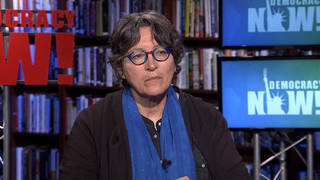
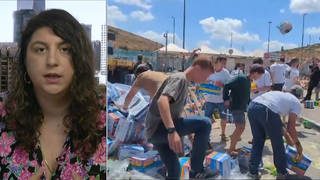
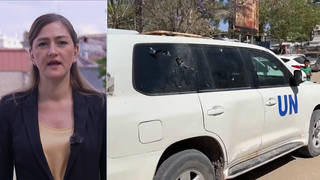
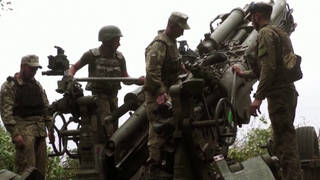
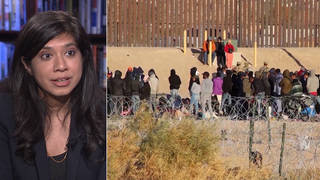




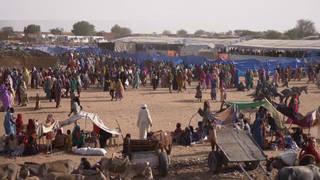
Media Options